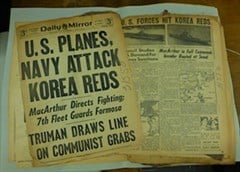The Senate is considering legislation to shift the war power largely to the president and a 20-person legislative committee. The result would undermine the constitutional role of 515 other members of Congress and the duty they have to represent the interests of their constituents.
The stated purpose of S. 1939, introduced by Sens. Tim Kaine (D-Va.), John McCain (R-Ariz.) and Angus King (I-Maine), is to repeal the War Powers Resolution of 1973 and create a procedure that allows for rapid responses to emerging threats. The bill would make matters worse by strengthening the president at the expense of Congress and representative government.
Despite the claim of S. 1939 that it is “not meant to define, circumscribe, or enhance the constitutional war powers of either the executive or legislative branch of government,” without question it substantially enhances presidential power.
The scope of the bill depends partly on its vague definition of “significant armed conflict:” any conflict expressly authorized by Congress “or any combat operation involving members of the Armed Forces lasting more than a week or expected by the president to last more than a week.” In 2011, President Obama estimated that the military operation against Libya would take a matter of days, not weeks. It lasted seven months. If enacted, the legislation would encourage an administration to make artificially low estimates of the time needed for contemplated military actions.
Moreover, the bill provides that “significant armed conflict” would not include “limited acts of reprisal against terrorists or states that sponsor terrorism.” The Constitution makes no such exception. Offensive operations against another country require either a declaration or authorization by Congress. The bill’s language could — and I fear would — be interpreted to provide statutory authorization for a president to order unilateral military strikes against Syria, Iran and many other nations.
The procedure for consulting with the 20-person committee is fraught with problems. It requires that the president consult for “significant armed conflict,” but the president would have complete discretion to withhold a classified report from the committee if there is a “need for secrecy or other [undefined] emergency circumstances.” Both Congress and this specially created committee would be in the dark about the need for military action. This bill could have permitted unilateral presidential military actions against Libya in 2011, Syria in 2013 and prospectively against Iran.
S. 1939 sets out an expedited process for Congress to act on presidential requests to commit U.S. forces abroad. In so doing, it necessarily undercuts the deliberative process in Congress that is the core of democratic government. The framers insisted that Congress publicly and carefully consider taking the nation from a state of peace to a state of war. We can recall earlier efforts for a “rush to war” that did great damage to the nation, including the war against Korea in 1950, the Tonkin Gulf Resolution of 1964 authorizing military action against Vietnam, and the Iraq Resolution of 2002 that depended on false claims from the administration that Saddam Hussein possessed weapons of mass destruction.
Flickr/wundoroo


